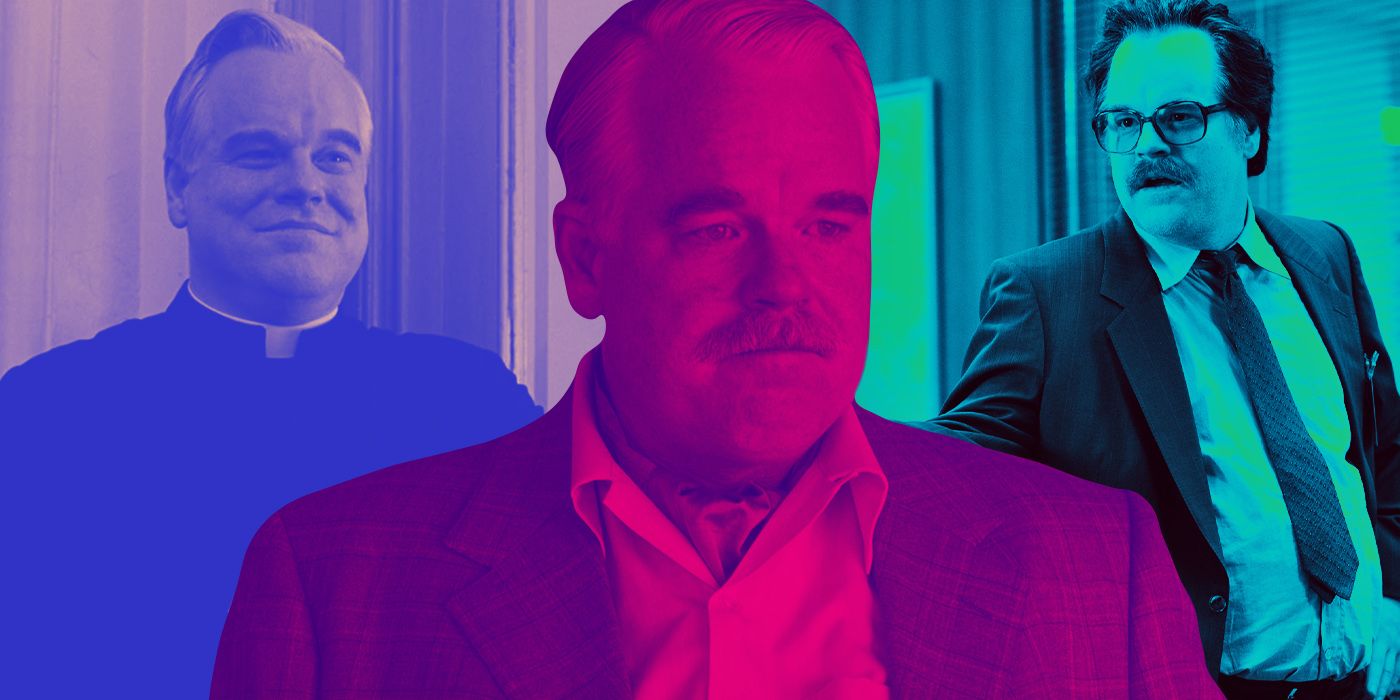Summary
- Philip Seymour Hoffman was a versatile and talented character actor who never stopped embracing his craft despite gaining fame as a star.
- Hoffman’s career is incredibly deep and rich, demanding continual exploration to fully appreciate the range of his performances.
- Hoffman’s performances were characterized by his ability to emotionally and physically disappear into his roles, creating unforgettable characters that revealed his immense talent as an actor.
Like Jack Nicholson, Philip Seymour Hoffman was a great character actor before he became a star. However, while Nicholson fully embraced stardom, Hoffman never stopped being a character actor after gaining fame with his titular Oscar-winning performance in the 2005 biographical drama film Capote. Hoffman had an uncanny ability to transform character roles into starring roles and vice versa.
Hoffman’s incomparably adventurous and varied career isn’t defined by his deserved Oscar or any single performance. Hoffman’s career, encompassing more than 50 feature film appearances before his death, contains so much depth and riches that it defies concise summarization and demands continual exploration instead. There are still so many valuable discoveries left to be made within Hoffman’s career that one needs a shovel to get through it all.
Hoffman left behind a voluminous gallery of distinctive, unforgettable performances, each of which, to varying degrees, contributed to an overall portrait and understanding of who Hoffman was as an actor and a person. Moreover, while an entire decade has passed since Hoffman’s death, Hoffman’s career has retained the relevancy and vibrancy of an actor who exists in the present tense.
Philip Seymour Hoffman Was a Versatile Actor
While Philip Seymour Hoffman possessed uncommon range and versatility as an actor, Hoffman invariably gravitated toward playing jerks and misfits in some of his best movies with a level of nuance and subtlety that made these unattractive characters into identifiable people who are worthy of respect and understanding.
In the 1997 comedy-drama film Boogie Nights, a stringy-haired Hoffman gives a heartbreaking performance as Scotty, a gay young man who struggles with his identity and the romantic feelings that he has for Mark Wahlberg’s Dirk Diggler. In the 1998 black comedy film Happiness, Hoffman projects a genuine sense of anguish with his performance as Allen, a sexually dysfunctional creep who makes obscene phone calls to women.
The 20 Best Actors Never Nominated for an Oscar
These are among the most talented actors of their respective generations despite never being nominated at the Academy Awards.
Hoffman’s acting career was also defined by his unmatched ability to emotionally and physically disappear within his roles, especially when playing real-life characters. As mythic novelist Truman Capote in Capote, Hoffman captures the essence of the charming but duplicitous Capote amid Hoffman’s stunning physical impersonation.
Hoffman’s performance transcends mere impersonation by revealing how Capote’s struggle to reconcile his compulsion to complete the iconic true crime novel In Cold Blood with the personal attachment that Capote developed with his murderous subjects ultimately destroyed Capote’s life.
Hoffman Was the Ultimate Anti-Star
While Philip Seymour Hoffman’s inherently offbeat sensibilities and unconventional appearance prevented the actor from becoming a box-office draw, his portly appearance nonetheless made him seem much more relatable in a wide range of roles than most conventionally handsome leading men.
Hoffman’s most direct bid for commercial acceptance came in Mission: Impossible III, in which Hoffman plays the villainous arms dealer Owen Davian. While Mission: Impossible III marked Hoffman’s first leading role in a big-budget film, Hoffman more than holds his own opposite star, Tom Cruise, in the movie, for which Hoffman’s delicious performance is one of the film’s highlights.
While many of Hoffman’s films have enjoyed enduring popularity in their post-theatrical lives, some of his best screen performances have yet to be discovered by most audiences. One of Hoffman’s best performances can be found in the underrated 2003 thriller film Owning Mahowny, in which Hoffman stars as the titular character, Dan Mahowny, a seemingly mild-mannered bank executive who embezzles money to finance his gambling addiction.
Another outstanding Hoffman performance is contained in the offbeat 2008 psychological drama film Synecdoche, New York, in which Hoffman plays Caden Cotard, a struggling theater director whose obsessive quest for realism in his work, for which he attempts to build a life-size replica of New York City inside a warehouse, causes him to lose sight of the difference between fiction and reality. While Synecdoche, New York, which was directed and written by Charlie Kaufman, certainly confused some audiences and critics at the time of the film’s release, the enigmatic movie is nonetheless considered by some critics to be one of the greatest films ever made.
Hoffman Is Dearly Missed but Vividly Remembered
Philip Seymour Hoffman, who would now be 56 if he were still alive, was considered one of his generation’s most adventurous and interesting actors at the time of his death. Hoffman is now regarded as one of the greatest actors of the past 30 years if not all time. While it’s tantalizing to consider how he would have continued to develop as an actor over the past decade, his unknowable future can perhaps be most clearly visualized through the career of Hoffman’s most cherished and frequent colleague, Paul Thomas Anderson, whose working relationship with the actor began with Anderson’s feature directorial debut, the 1996 crime film Hard Eight, and ended with the 2012 psychological drama film The Master, for which Hoffman received his fourth and final Oscar nomination.
Hoffman’s spirit seems eerily present in Anderson’s most recent film, the 2021 comedy-drama coming-of-age film Licorice Pizza, in which Hoffman’s son, Cooper Hoffman, stars as a 1970s teenage actor who embarks on a relationship with a 25-year-old woman. One of the most poignant aspects of the film is to imagine how Hoffman would have appeared in the movie alongside his son.
This story originally appeared on Movieweb

